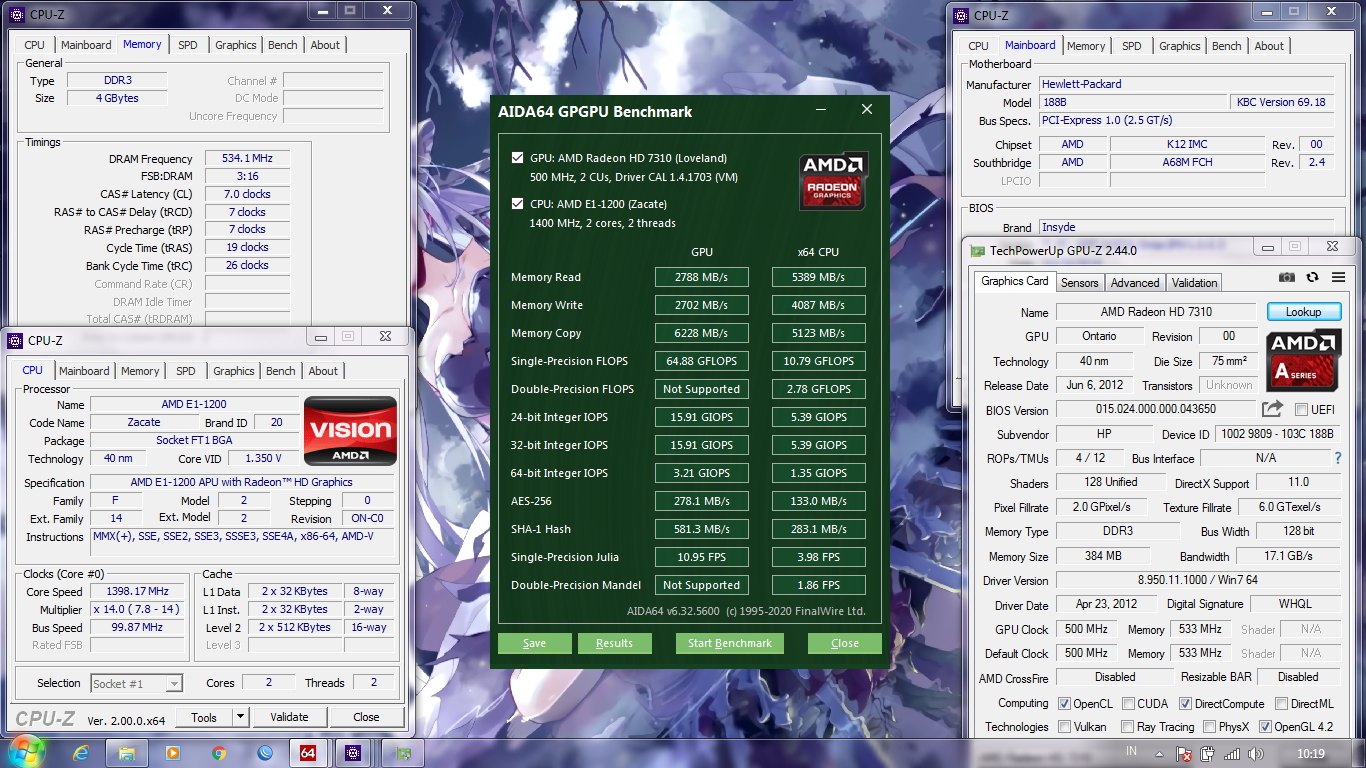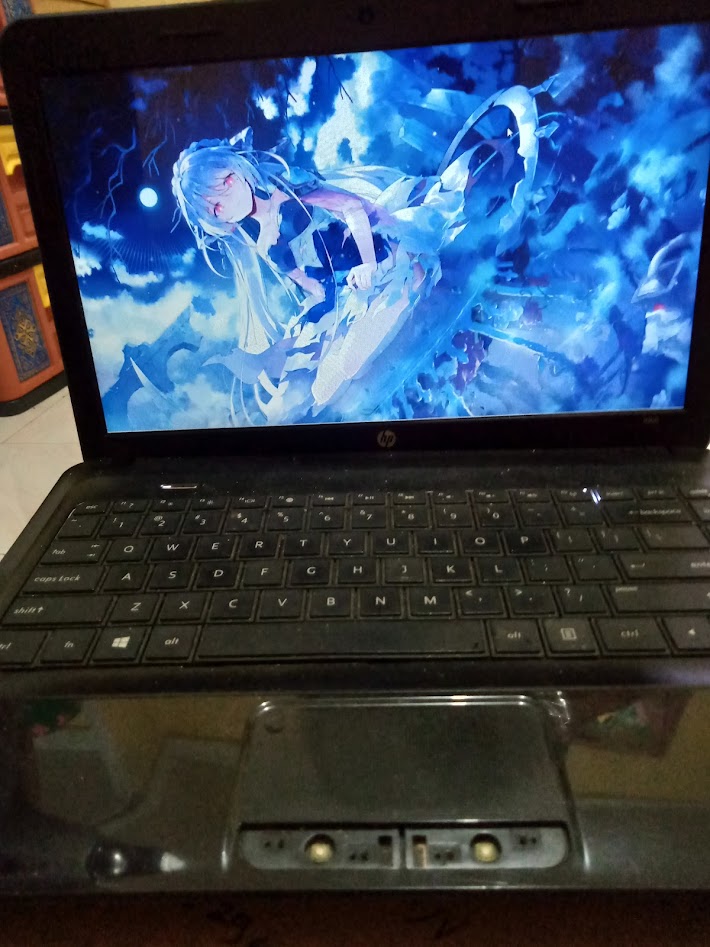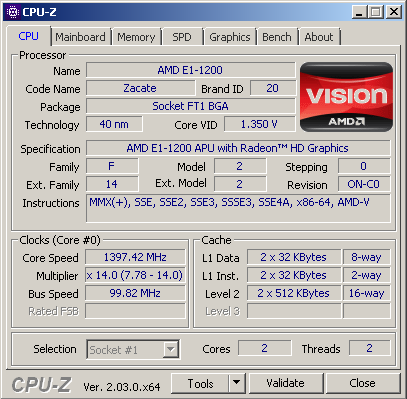AIDA64 GPGPU Benchmark - Single Precision FLOPS score 10.79 GFLOPS with a E1-1200
Friday, 27 January 2023 10:52 | Update at 2 years ago
Media Gallery
Screenshot

Device, Setup, etc



URL
https://bit.ly/3RauwX4Information Detail
Hardware: AMD E1-1200
Specs:CPUID : AMD E1-1200 APU with Radeon(TM) HD Graphics
Architecture : x86
Codename : Zacate
L3 Cache : -
Clock : 1.4GHz
Core/Thread : 2/2
TDP : 18W
Technology : 40nm
Socket : FT1 BGA 413-Ball
IGPU : AMD Radeon HD 7310
See more specification...
Software: AIDA64 GPGPU Benchmark - Single Precision FLOPS
Score: 10.79 GFLOPS
About: AIDA64 GPGPU Benchmark - Single Precision FLOPSAIDA64 GPGPU Benchmark is a benchmarking feature available within the AIDA64 application, specifically aimed at measuring GPU parallel computing performance through OpenCL technology. It can be accessed through the Tools | GPGPU Benchmark menu, and is designed to evaluate the ability of various GPU devices to run compute-intensive workloads. AIDA64 supports testing up to 16 GPUs simultaneously, including combinations of AMD, Intel, and NVIDIA, whether in discrete GPU (dGPU), integrated GPU (APU), or multi-GPU systems such as SLI and CrossFire.
One of the key tests in this benchmark is Single Precision FLOPS, which measures the GPU's ability to perform 32-bit floating point operations (FP32). This test is important because many modern applications-especially in graphics, physics, AI, and video processing-rely on FP32 as the basis for key calculations. The resulting score in GFLOPS (Giga Floating Point Operations per Second) indicates how fast the GPU can complete a large number of single-precision mathematical calculations in parallel.
This benchmark not only provides a benchmark of general GPU computing performance, but is also an important indicator for GPGPU-based workloads (General Purpose GPU Computing). By relying on the OpenCL standard, this test is cross-platform and able to measure the performance of various GPU vendors in a fair and open manner. Even systems with mixed or hybrid GPUs can be thoroughly tested as long as they are recognized as computing units by the OpenCL driver.
The AIDA64 GPGPU Benchmark is particularly useful for professional users, parallel software developers, and technology enthusiasts who want to assess the power of their GPU in a computational context, not just in graphics rendering. With support for multi-GPU configurations and detailed results, this benchmark is a reliable tool for evaluating hardware performance in demanding tasks that require precision and high throughput.
Released in 2012 as part of the Brazos 2.0 family, the AMD E1-1200 is a power-efficient processor aimed at entry-level laptops. It has a 2 core and 2 thread configuration with a fixed clock speed of 1.4 GHz, with no support for Turbo Core technology. Built with a 40nm fabrication process, the E1-1200 has a TDP value of 18 watts-efficient enough for portable devices that emphasize low power consumption and longer battery life. Despite its limited performance, the E1-1200 was a popular choice in its day thanks to its affordable price and ability to handle light computing needs.
One of the main advantages of the AMD E1-1200 is the integrated Radeon HD 7310 GPU, which offers better graphics performance than Intel's entry-level graphics solutions at the time. This GPU has the ability to play HD resolution videos smoothly, as well as run light games such as Counter Strike 1.6, Plants vs Zombies, or other casual games with minimum graphics settings. That said, this combination of CPU and GPU is not intended for heavy-duty work such as video editing, 3D rendering, or modern gaming. Overall performance is more optimal when used for tasks such as browsing, streaming videos, accessing social media, typing documents, as well as basic office applications.
However, it should be noted that the AMD E1-1200 is less suitable for heavy multitasking, especially in modern operating systems like Windows 10. With a low clock speed and no Boost feature, users may experience lag or limitations when opening multiple applications at once. In tests using the HP 1000 1b05au laptop, this processor was paired with 4GB DDR3 single channel RAM (2 DIMM slots) and tested on Windows 7, Windows 8, and Windows 10 operating systems. The results show that the most optimal performance is achieved on Windows 7 or Windows 8, while in Windows 10 the system tends to be slow although it can still be used for basic needs. As such, the AMD E1-1200 can still be relied upon as a power-efficient and inexpensive solution for users with very light computing needs.
Hardware Detail:
Device: HP 1000 1b05au
RAM: 4GB DDR3 Single Channel 2 DIMM
OS: Windows 7, Windows 8, Windows 10
* Not Avaiable
